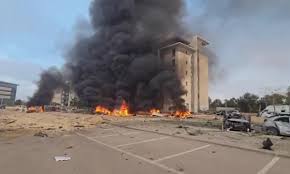Blaze Near Microsoft’s Israel Office Sparks Civilian Fears Amid Escalating Strikes
On June 21, a fire erupted on a street near Microsoft’s offices in Beer Sheva, southern Israel, prompting widespread concern as the Israel–Iran conflict increasingly impacts civilian zones. Local media reported that the blaze, fueled by falling debris from nearby missile interceptions, damaged adjacent buildings and forced the evacuation of nearby businesses and homes. No casualties were reported, but the psychological impact on residents and corporate staff was immediate.
Authorities have not confirmed whether the fire was caused directly by Iranian projectiles or by falling Israeli defense debris intercepted by the Iron Dome. However, the incident underscores the growing vulnerability of urban and commercial infrastructure as hostilities intensify between the two nations. Microsoft has not commented on any damage to its premises, but security protocols were reportedly activated across its regional offices in Tel Aviv, Haifa, and Beer Sheva.
Israel's Home Front Command issued renewed shelter warnings across southern districts, including Negev and Ashkelon, advising businesses to reduce in-person operations and ensure access to protected spaces. Local startups and international tech firms operating in Israel’s “Cyber Belt” have begun implementing contingency plans, including remote work mandates, data center backups, and staff relocation strategies.
The fire also triggered alarms among international investors and multinational corporations with assets in Israel. Analysts note that Israel’s robust high-tech industry—centered in hubs like Beer Sheva and Herzliya—may become a strategic target in asymmetric attacks aiming to erode Israel’s economic strength.
Iranian state media indirectly referenced “economic nodes of Zionist interest” as potential retaliation targets, further raising red flags among foreign business stakeholders. While Microsoft remains operational, other firms have begun relocating critical infrastructure to less exposed regions or offshore cloud environments.
This incident adds to a string of civilian zone disturbances in the escalating air war. Earlier this week, a shopping mall in Ashdod sustained damage from falling shrapnel, and power grids in Netivot experienced outages linked to aerial combat in surrounding skies.
With no ceasefire in sight, both civilians and commercial actors find themselves on the frontlines of a conflict rapidly expanding beyond military targets—forcing cities, companies, and citizens to prepare for the unpredictable.








